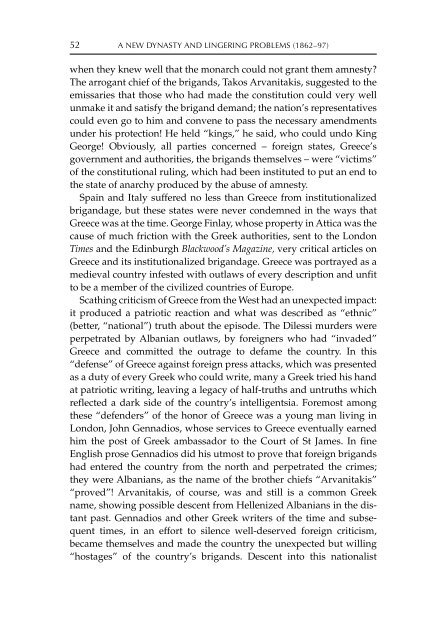MODERN GREECE: A History since 1821 - Amazon Web Services
MODERN GREECE: A History since 1821 - Amazon Web Services
MODERN GREECE: A History since 1821 - Amazon Web Services
You also want an ePaper? Increase the reach of your titles
YUMPU automatically turns print PDFs into web optimized ePapers that Google loves.
52 A NEW DYNASTY AND LINGERING PROBLEMS (1862–97)<br />
when they knew well that the monarch could not grant them amnesty?<br />
The arrogant chief of the brigands, Takos Arvanitakis, suggested to the<br />
emissaries that those who had made the constitution could very well<br />
unmake it and satisfy the brigand demand; the nation’s representatives<br />
could even go to him and convene to pass the necessary amendments<br />
under his protection! He held “kings,” he said, who could undo King<br />
George! Obviously, all parties concerned – foreign states, Greece’s<br />
government and authorities, the brigands themselves – were “victims”<br />
of the constitutional ruling, which had been instituted to put an end to<br />
the state of anarchy produced by the abuse of amnesty.<br />
Spain and Italy suffered no less than Greece from institutionalized<br />
brigandage, but these states were never condemned in the ways that<br />
Greece was at the time. George Finlay, whose property in Attica was the<br />
cause of much friction with the Greek authorities, sent to the London<br />
Times and the Edinburgh Blackwood’s Magazine, very critical articles on<br />
Greece and its institutionalized brigandage. Greece was portrayed as a<br />
medieval country infested with outlaws of every description and unfit<br />
to be a member of the civilized countries of Europe.<br />
Scathing criticism of Greece from the West had an unexpected impact:<br />
it produced a patriotic reaction and what was described as “ethnic”<br />
(better, “national”) truth about the episode. The Dilessi murders were<br />
perpetrated by Albanian outlaws, by foreigners who had “invaded”<br />
Greece and committed the outrage to defame the country. In this<br />
“defense” of Greece against foreign press attacks, which was presented<br />
as a duty of every Greek who could write, many a Greek tried his hand<br />
at patriotic writing, leaving a legacy of half-truths and untruths which<br />
reflected a dark side of the country’s intelligentsia. Foremost among<br />
these “defenders” of the honor of Greece was a young man living in<br />
London, John Gennadios, whose services to Greece eventually earned<br />
him the post of Greek ambassador to the Court of St James. In fine<br />
English prose Gennadios did his utmost to prove that foreign brigands<br />
had entered the country from the north and perpetrated the crimes;<br />
they were Albanians, as the name of the brother chiefs “Arvanitakis”<br />
“proved”! Arvanitakis, of course, was and still is a common Greek<br />
name, showing possible descent from Hellenized Albanians in the distant<br />
past. Gennadios and other Greek writers of the time and subsequent<br />
times, in an effort to silence well-deserved foreign criticism,<br />
became themselves and made the country the unexpected but willing<br />
“hostages” of the country’s brigands. Descent into this nationalist


